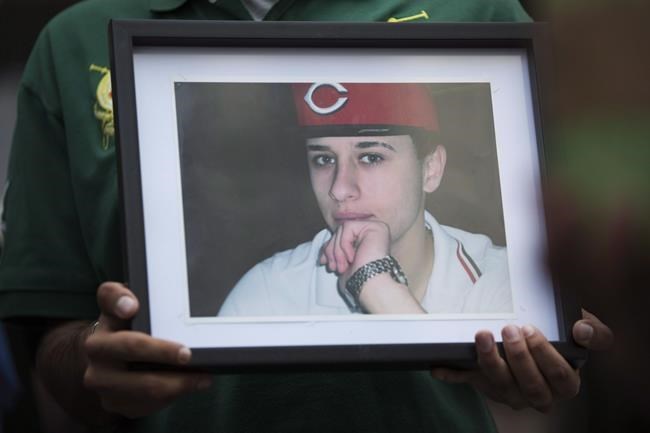TORONTO — Jurors in a coroner's inquest into the death of a teen shot by a Toronto police officer more than a decade ago issued dozens of recommendations Thursday in an effort to prevent similar deaths in the future.
The inquest into the death of Sammy Yatim focused on issues related to police decision making and best practices in dealing with people in crisis. Jurors were told at the outset and throughout the process that they should not try to re-examine the details of the shooting or the actions of the officer, then-Const. James Forcillo.
The jury's recommendations touch on issues such as officer training and monitoring, peer intervention and mental health supports for officers and family members of those killed or seriously injured by police. Many were part of a slate of recommendations jointly proposed by the parties in the inquest, which included Yatim's relatives, the Toronto Police Services Board and the Toronto Transit Commission.
One recommendation calls for ensuring that peer intervention training become a mandatory component of the annual recertification training officers receive. The training should emphasize that officers who do intervene will not face repercussions, while there is a "potential for misconduct" for those who fail to step in.
It should also stress that officers have a duty to intervene when witnessing misconduct, the document said.
Jurors also recommended a review of the database system used to monitor use-of-force incidents and other occurrences. Part of that process would be to review the number of incidents that triggers an alert for early intervention, whether additional types of incidents should be logged, and how to record the outcome of any intervention stemming from the alerts.
The inquest heard that Forcillo had drawn a firearm six times in the 15 months before Yatim's death. He testified he did not remember receiving any feedback on those incidents.
Another recommendation calls for financial and mental health supports for family members of people who were killed or seriously injured in an interaction with police -- something Yatim's parents and sister had petitioned for.
Jurors expressed their condolences to Yatim's family after the recommendations were read aloud Thursday.
"We wanted to express our heartfelt condolences to the family on the tragic loss of Sammy," one of the jurors said. "It is our hope that the recommendations put forward from this inquest will make Ontario a better and safer place to live."
Yatim was alone on a streetcar and holding a small knife when he was hit by two volleys of shots shortly after midnight on July 27, 2013. He was 18 at the time.
Forcillo was found not guilty of second-degree murder in connection with the first volley of bullets, which court heard was fatal, but was convicted of attempted murder for the second volley, fired when Yatim was already on the ground.
Forcillo was sentenced to six and a half years behind bars and was granted full parole in 2020.
During his testimony, Forcillo said he believed it would have made "a world of difference" if he'd had access to a stun gun that night.
At the time, only front-line supervisors had access to stun guns, the inquest heard. That has since changed, and the devices are now widely available to front-line officers, it heard.
An agreed statement of facts read at the beginning of the inquest said that a supervisor equipped with a stun gun arrived at the scene roughly 20 seconds after the last shot was fired. The stun gun was then used on Yatim as he lay on the ground.
This report by The Canadian Press was first published Feb. 1, 2024.
Paola Loriggio, The Canadian Press




